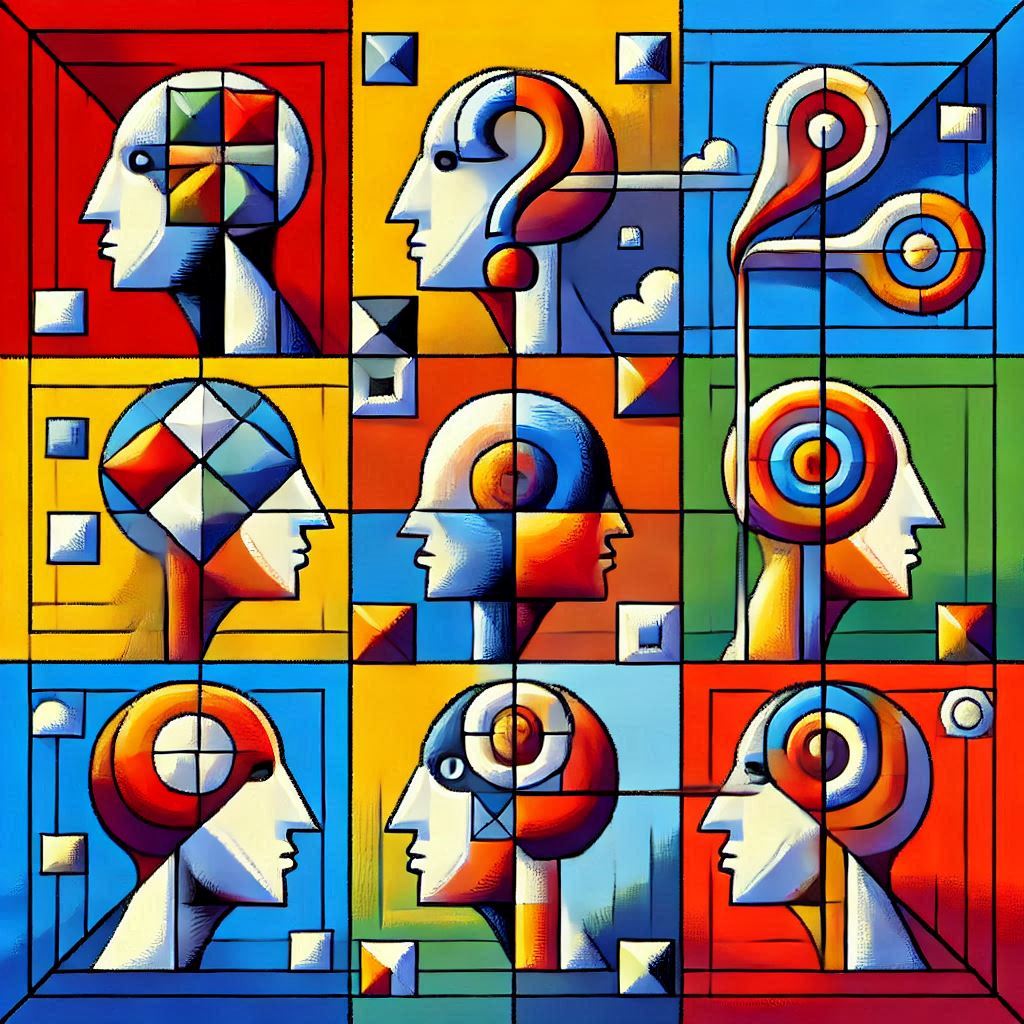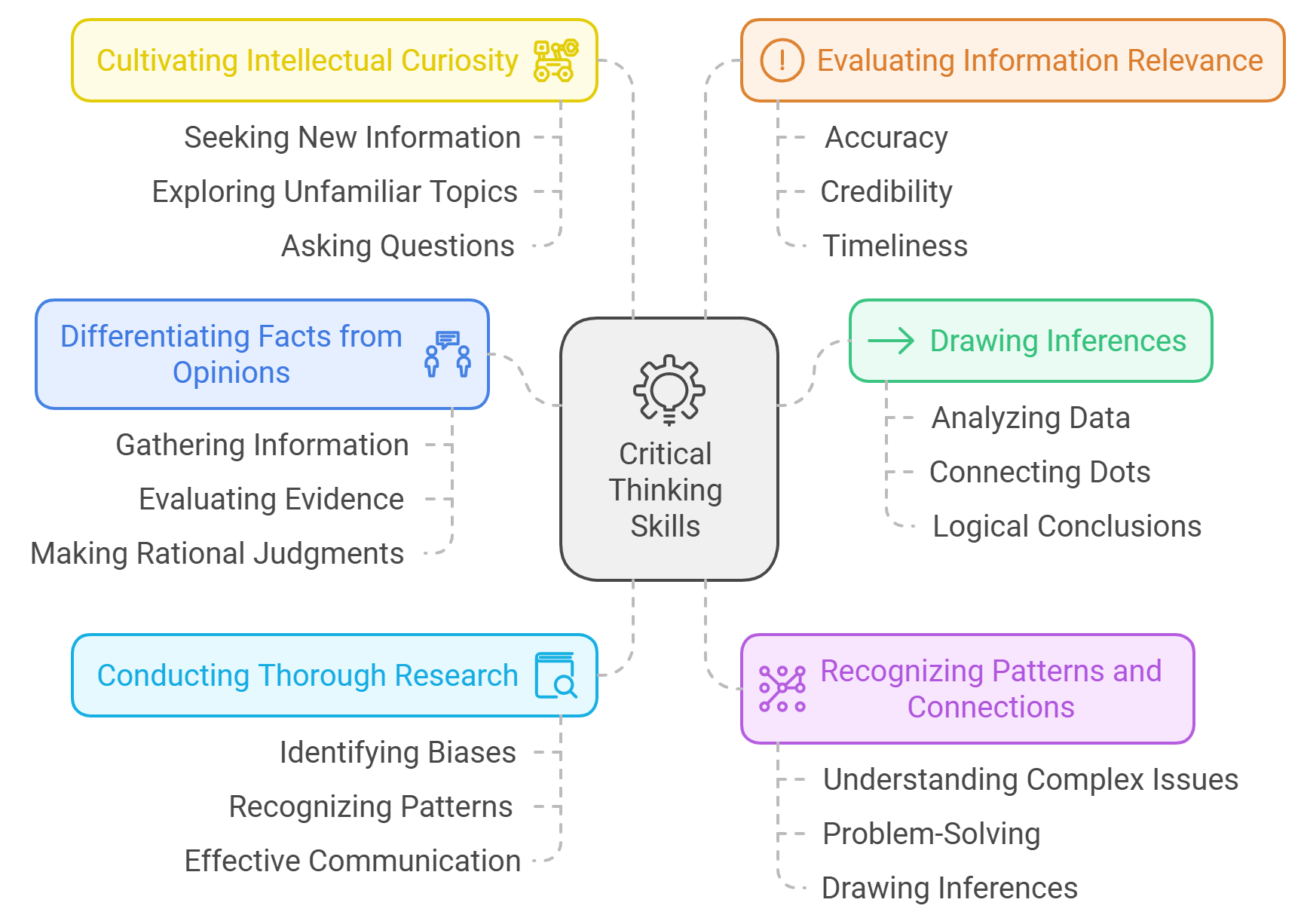Key Concepts of Critical Thinking
In a world with lots of information, it’s important to develop critical thinking skills. These skills help us evaluate and analyze information to make better decisions. Critical thinking involves asking questions, challenging assumptions, and being open-minded. Understanding these concepts helps us make sense of the world around us. Let’s explore some of these concepts and see how they can impact our everyday lives.
Defining Critical Thinking
Critical thinking involves analyzing facts objectively, thinking clearly, and making rational judgments. It helps individuals gather relevant information, think through solutions and conclusions, and consider alternative systems of thought. Effective communication and the willingness to admit when one is wrong or does not know the answer are also part of critical thinking.
Developing a mindset geared towards critical analysis involves honing skills such as identifying biases, inference, research, identification, curiosity, and judging relevance. Obstacles to critical thinking include personal biases, emotional reactions, and a lack of curiosity. These obstacles can be navigated by actively seeking diverse perspectives, questioning assumptions, and being open to new information and ideas. Understanding and developing critical thinking skills can help individuals navigate challenging scenarios and improve their overall performance in their professional and personal lives.
Characteristics of a Critical Thinker
Inclination Towards Analysis

Individuals’ curiosity, desire for understanding, and exposure to diverse perspectives influence their inclination toward analysis. This curiosity can be sparked by experiences like exposure to different cultures, travel, or engaging in thought-provoking discussions. Upbringing, education, and environment also play a significant role in shaping this inclination.
An inclination towards analysis significantly impacts critical thinking skills. It fosters the ability to gather relevant information, think through solutions and conclusions, and consider alternative systems of thought. It encourages effective communication, questioning assumptions, and critically evaluating encountered information. Those with a strong inclination towards analysis are likely to be open to new ideas, willing to admit when wrong, and eager to seek diverse perspectives.
Strategies such as active listening, continuous learning, and engaging in structured problem-solving activities can enhance an individual’s inclination toward analysis. Encouraging individuals to ask questions, seek out new information, and critically evaluate their thought processes can also develop this skill. Fostering an environment that promotes constructive dialogue, challenges assumptions, and values diverse perspectives can further enhance an individual’s inclination toward analysis.
Building Sound Arguments

Building sound arguments involves using effective critical thinking skills. This includes asking questions, gathering information, and thinking through solutions. Logical reasoning is important for analyzing facts objectively and making rational judgments. Considering alternative perspectives is also crucial for exploring diverse viewpoints and strengthening arguments.
To establish evaluation criteria for constructing sound arguments, one can use skills such as identifying biases, conducting thorough research, and judging relevance. These strategies ensure that arguments are well-supported by credible evidence, making them more effective. Communication is vital to articulate arguments clearly and persuasively, enhancing their impact.
Logical Reasoning Proficiency

Assessing someone’s logical reasoning proficiency involves evaluating their ability to analyze information, identify assumptions, evaluate evidence, and construct clear and coherent arguments.
It’s essential to identify logical fallacies, use relevant evidence, and present reasoning in a structured and systematic manner. To improve logical reasoning skills in everyday life, individuals can practice activities like solving puzzles, engaging in debates, evaluating the credibility of sources, and actively seeking diverse perspectives and viewpoints.
Developing metacognition, or the ability to think about one’s thinking process, is also crucial in improving logical reasoning skills. By continuously applying these strategies, individuals can strengthen their logical reasoning proficiency and make better-informed decisions in various aspects of their professional and personal lives.
Establishing Evaluation Criteria

One way to establish clear and relevant criteria for evaluating information and ideas is to consider the source’s credibility, relevance, and potential biases.
For example, when evaluating an article, one might assess the author’s credentials, the timeliness of the information, and the potential for any conflicting interests.
Additionally, determining the effectiveness of a critical thinking framework involves considering its scope, its adaptability to different scenarios, and its ability to produce well-reasoned conclusions.
For instance, a critical thinking framework that encourages open-mindedness, evidence-based reasoning, and effective communication is more likely to be effective in various contexts.
Consistent and standardized evaluation criteria for critical thinking are important to ensure fair and reliable assessments.
This is particularly vital in professional settings where critical thinking skills are used to solve complex problems and make informed decisions.
Without standardized evaluation criteria, there would be a lack of consistency in assessing individuals’ critical thinking abilities and determining their suitability for specific roles or tasks.
Practicing Self-Reflection

Developing a regular practice of self-reflection in your daily routine involves setting aside time for introspection. This could be as simple as keeping a journal to record your thoughts, feelings, and experiences. Reflecting on various situations and outcomes allows you to grow and make better decisions.
Effective strategies for incorporating self-reflection into decision-making processes include actively seeking feedback from others, evaluating past decisions and their impacts, and considering different perspectives before reaching conclusions. Self-reflection helps improve critical thinking skills by promoting introspection, self-awareness, and consideration of alternative viewpoints.
It also allows for analyzing different outcomes and developing logical reasoning, ultimately enhancing the overall critical thinking process.
The Importance of Critical Thinking Skills

Differentiating Facts from Opinions
Differentiating between facts and opinions is important for developing critical thinking skills. One way to do this is by gathering relevant information and thinking through solutions and conclusions.
Critical thinkers consider different ways of thinking and communicate effectively, allowing them to differentiate between factual statements and personal opinions. For example, when facing an argument, critical thinkers carefully evaluate the evidence presented and the reasoning behind it, making sure that factual information is not mistaken for an opinion.
Distinguishing facts and opinions is essential in critical thinking because it allows individuals to make rational judgments based on objective information rather than subjective beliefs, especially in decision-making and problem-solving scenarios. Differentiating between facts and opinions in a work environment helps professionals navigate challenges effectively and make well-informed choices.
Therefore, distinguishing between facts and opinions is essential to critical thinking. It helps individuals approach situations objectively and draw informed conclusions.
The Act of Drawing Inferences
Drawing inferences helps individuals think critically. It allows them to analyze information, connect the dots, and make logical conclusions without explicit details. For instance, an employee may need to draw inferences from data to make informed decisions or solve a problem in a work scenario.
Educators and professionals can teach and practice drawing inferences in critical thinking using methods such as case studies, real-life scenarios, and group discussions. These methods help individuals practice inferencing skills in different contexts and learn from others’ perspectives.
Drawing inferences helps individuals see beyond the surface level of information and make reasoned judgments. This skill is valuable for understanding complex relationships or social dynamics in personal settings. It enables individuals to interpret social cues better and make better decisions in their interactions.
Conducting Thorough Research
Thorough research involves several steps and techniques. These include gathering relevant information, considering alternative systems of thought, and communicating effectively.
Critical thinking skills can help evaluate information and sources effectively during research. This is done by analyzing facts objectively, thinking clearly, and making rational judgments.
When conducting research, recognizing patterns, drawing inferences, and differentiating facts from opinions are best practices in critical thinking. For example, identifying biases, curiosity, and judging relevance are crucial skills in the critical thinking process. They help individuals navigate challenging scenarios and improve overall performance in both their professional and personal lives.
Recognizing Patterns and Connections
Recognizing patterns and connections is vital for developing critical thinking skills. By identifying recurring themes or trends, individuals can analyze information more effectively. They can also make connections between seemingly unrelated concepts. This can lead to a deeper understanding of complex issues and help in problem-solving and decision-making. Recognizing patterns and connections can provide evidence to support one’s point of view when drawing inferences and making arguments.
This helps in reaching more sound and well-reasoned conclusions. Moreover, this skill helps individuals differentiate between facts and opinions. It enables them to discern commonalities across various sources of information and identify reliable, evidence-based data.
Cultivating Intellectual Curiosity
Individuals can cultivate their intellectual curiosity by seeking new information, exploring unfamiliar topics, and asking thought-provoking questions. They can attend workshops, read books, or engage in discussions with diverse groups of people to gain exposure to different perspectives and ideas.
To encourage thorough research and analysis, individuals can verify the credibility of sources, cross-reference information, and consider potential biases. They can also evaluate the relevance and reliability of data by examining multiple sources and critically assessing the information presented.
Self-reflection contributes to developing critical thinking skills and intellectual curiosity by enabling individuals to analyze their thought processes, identify areas for improvement, and learn from past experiences. By considering their own biases and assumptions, individuals can gain insight into their decision-making and thought patterns, leading to enhanced critical thinking abilities.
Evaluating Information Relevance
When evaluating the relevance of information in critical thinking, it’s important to consider how it directly relates to the issue at hand and whether it contributes to a clear understanding of the problem.
Criteria such as accuracy, credibility, and timeliness are used to assess the relevance of information in critical thinking.
Evaluating the relevance of information in the critical thinking process ensures that only pertinent and reliable data is used to make informed decisions and draw logical conclusions.
By evaluating the relevance of information, critical thinkers can avoid being swayed by irrelevant details, focus on what truly matters, solve problems effectively, and make sound judgments.
Applying Critical Thinking in Everyday Life
Critical thinking skills help individuals differentiate between facts and opinions in everyday life. They can gather relevant information, consider alternative systems of thought, and formulate solutions and conclusions.
For example, when faced with conflicting information, they can seek out multiple sources to verify accuracy and analyze it objectively. Recognizing patterns and connections in everyday situations through critical thinking involves asking questions, thinking through solutions and conclusions, and communicating effectively.
When encountering a recurring problem, individuals can take a step back and consider alternative systems of thought to identify potential root causes and find effective solutions. Cultivating intellectual curiosity and consistently applying critical thinking in daily decision-making means gathering relevant information, considering alternative systems of thought, and thinking through solutions and conclusions.
Individuals can develop a habit of seeking out new information, asking questions, and thinking critically about various options before making decisions.
Methods to Enhance Your Critical Thinking
Framework Selection for Effective Thinking
Effective thinking is essential for improving decision-making. When choosing a thinking framework, individuals should consider whether it aligns with their current thought processes and work environment. They should also understand their learning styles and evaluate whether the framework provides practical examples. Choosing a consistent critical thinking framework is key for analyzing and evaluating information effectively.
Recognizing the need for a specific framework helps individuals overcome thinking obstacles. Developing critical thinking skills helps navigate challenges and enhances overall performance in both personal and professional life.
Explaining the Need for a Consistent Critical Thinking Framework
Lacking a consistent critical thinking framework can lead to hasty and irrational decisions, susceptibility to misinformation, and difficulty seeing alternative perspectives. It can make gathering and analyzing relevant information challenging, resulting in faulty conclusions and poor judgment.
A consistent critical thinking framework enhances problem-solving and decision-making abilities by allowing individuals to assess situations objectively, consider multiple viewpoints, and identify potential biases in their own thinking. It encourages exploring alternative solutions and anticipating potential flaws in reasoning, leading to more well-informed and effective problem-solving.
Using a consistent critical thinking framework provides benefits in various aspects of life. It improves professional performance, fosters better communication, and promotes personal growth. Strong critical thinking skills in professional settings help handle complex work scenarios, make strategic decisions, and contribute to innovative solutions. They also lead to more effective communication, improved interpersonal relationships, and a deeper understanding of various perspectives.
Developing a Mindset Geared Towards Critical Analysis
Individuals can develop a mindset geared towards critical analysis by:
- Asking questions,
- Gathering relevant information,
- Thinking through solutions and conclusions,
- Considering alternative systems of thought,
- And communicating effectively.
To enhance logical reasoning proficiency, strategies include:
- Willingness to admit when wrong or when not knowing the answer,
- Instead of relying on gut reactions or emotional point of view.
Furthermore, individuals can practice self-reflection by:
- Identifying biases,
- Making inferences,
- Conducting research,
- Staying curious,
- And judging relevance.
These practices play a crucial role in developing the ability to:
- Analyze facts objectively,
- Think clearly,
- And make rational judgments,
Thereby improving overall performance in professional and personal life.
Navigating Obstacles to Critical Thinking
Biases, emotional reasoning, and narrow-mindedness can hinder critical thinking. To overcome these obstacles, develop self-awareness and seek diverse perspectives. Cultivate open-mindedness and embrace uncertainty. Practice and continuous learning are essential for developing critical thinking skills.
Engage in debating, problem-solving, and analyzing complex issues to challenge assumptions and encourage critical thinking. Navigating biases and fallacies involves questioning assumptions, evaluating evidence, and considering alternative viewpoints. Hone research and analysis skills to identify and address biases and fallacies that hinder critical thinking, ultimately improving decision-making and problem-solving abilities.

Vizologi is a revolutionary AI-generated business strategy tool that offers its users access to advanced features to create and refine start-up ideas quickly.
It generates limitless business ideas, gains insights on markets and competitors, and automates business plan creation.


